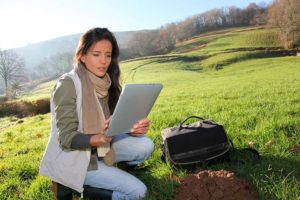how to become a geoscientist
A geoscientist studies the structure, progression, and composition of the Earth. They also study the Earth's past, present, and future in relation to it's internal composition like the atmosphere, oceans, and the Earth's electric, gravitational, and magnetic force.
Watch a Video:
How to Become a Geoscientist
Most employers require a bachelor's degree in a related field of science then many receive on-the-job training to specialize. A strong background in engineering, science, math, and technology is usually required. Considerable knowledge and work related experience would be very helpful too.
Job Description of a Geoscientist

A geoscientist studies the structure of the Earth and collects, measures, examines, and/or classifies rocks, soils, minerals, or fossils. They interpret and analyze geophysical, geological, or geochemical data from aerial photos, well logs, or bore holes. Field studies of geophysical, geochemical, or geological are conducted and samples collected for research, drilling, or testing programs. They use results from laboratory research or fieldwork to make maps, charts, and cross-sectional diagrams showing land use, mineral extraction, and resource management.
A geoscientist uses computer software to interpret and analyze geological information. A geoscientist looks to access surface water movement or ground movement in order to give suggestions on issues like route and site selection, contaminated sites, or waste management. They help find or estimate probable underground water resources, natural gas, or mineral deposits.
A geoscientist uses equipment such as gravimeters, seismographs, torsion balances, and magnetometers to measure the Earth's characteristics. A geoscientist requires knowledge in geography, math, physics, chemistry, engineering, and technology. They also need to know their biology of animal and plant organisms. A geoscientist works between an office, laboratory, and in the field. They work in remote areas and in all climates. Extensive travel for fieldwork may be needed.
Geoscientist Career Video Transcript
Geoscientists dwell in an unusual frame of reference… studying evidence of events that happened millions of years ago to understand the present and try to foresee future geological events. Geoscientists study the physical aspects of the Earth, such as its composition, structure, and processes, to understand how it was formed and what forces shaped its features. Splitting their time between the lab, the office and the field, geoscientists need a variety of skills. They need to be as comfortable and knowledgeable on a computer as they are on a hike, able to understand and critically analyze the samples and data they gather on a mountain peak, and just as capable of communicating their findings to an audience of nonscientists.
Their tools may include a classic hammer and chisel to gather rock samples, along with sophisticated remote sensing equipment to gather a broader impression of an area. Specializations offer very different opportunities; some analyze the probability of earthquakes and volcano eruptions, and study layers of rock under building foundations to ensure a stable foundation. Others explore for (and help develop) oil and gas resources, and clean up and reclaim land.
Some geoscientists study the chemistry and movement of ocean waters and how they affect climate and weather. Most entry-level geoscientists have a bachelor's degree in a related science. Fortunately, geoscientists don't mind getting their hands dirty in a career that benefits human life on Earth.
Article Citations
Bureau of Labor Statistics, U.S. Department of Labor, Occupational Outlook Handbook, Geoscientists.
National Center for O*NET Development. 19-2042.00. O*NET OnLine.
The career video is in the public domain from the U. S. Department of Labor, Employment and Training Administration.
how to become a geoscientist
Source: https://www.yourfreecareertest.com/geoscientist/
Posted by: haleypretted.blogspot.com

0 Response to "how to become a geoscientist"
Post a Comment